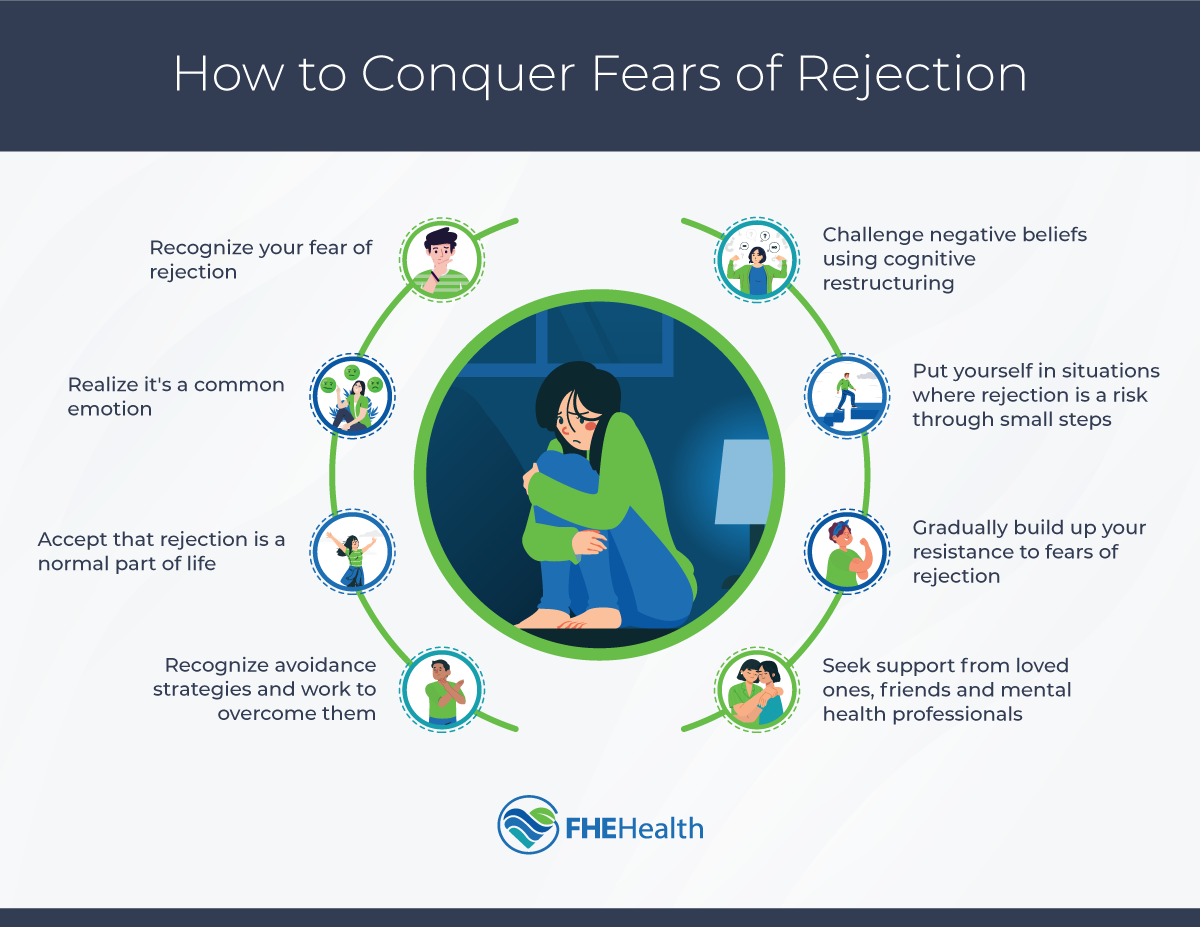
The fear of rejection is a common emotion, often fueled by a lack of confidence. It can impact all areas of your life, from your relationships at work to personal growth. Most people experience a degree of fear when placed in new situations, but for some, the fear of rejection impacts their quality of life. Whether you’re afraid of being rejected by a love interest, ignored by your friends or overlooked for a promotion at work, the fear of rejection can be debilitating. This article explores the root causes and the techniques and therapies often used when overcoming the fear of rejection. Like many fears, the fear of rejection may worsen over time if left untreated.
Exploring the Roots of Rejection Fears
Most people experience rejection at a young age. As a school-aged child, you may have been the last chosen for a class sports team or left out of a party invitation. Rejection leaves behind feelings of inadequacy and low self-worth. Once an individual experiences rejection, the fear of further rejection often follows, which stems from a deep-rooted desire to feel accepted or fit in. If you’ve ever felt rejection, you probably won’t be surprised to learn it activates the same area of the brain as physical pain.
One of the most common roots of the fear of rejection is the need for external validation. When we grow up attaching our self-worth to the opinions of others, we constantly seek approval. To overcome this fear, you must learn to recognize and accept that rejection is a normal part of life everyone experiences. When left untreated, the fear of rejection can lead to mental health conditions such as rejection sensitive dysphoria and avoidant personality disorder.
Some of the common signs of the fear of rejection include:
- Taking on too many responsibilities
- Being a people pleaser
- Remaining in unhealthy relationships
- Having feelings of failure
- Hiding thoughts and feelings from others
- Having difficulty saying no
- Allowing others to treat you poorly
- Being codependent
Recognizing Patterns of Avoidance and Anxiety
The fear of rejection often leads to insecure behaviors, avoidance and social anxiety, which often produces fears of being judged by others or being watched. Those with social anxiety disorder often dread speaking in public, meeting new people, talking to strangers and doing ordinary daily things, such as eating or drinking alone in a public place or attending a job interview.
These fears may become so intense that some individuals may avoid going to work or school, shopping, dating, expressing feelings or engaging with others out of fear of being humiliated and rejected. Others may put up emotional walls to prevent vulnerability.
Recognizing these fears and avoidance strategies is one of the first steps in facing rejection fears and understanding how rejection controls our lives. By embracing vulnerabilities and gradually exposing yourself to situations that put you at risk for anxiety, you can learn to confront these avoidance behaviors.
Challenging Negative Beliefs and Cognitive Restructuring
Having negative thoughts about yourself reinforces the fear of rejection from others. You may feel you don’t deserve happiness or you’re not as good as others. You may also feel you’re not smart enough or pretty enough. These negative self-talk examples lead to distorted thinking patterns that make anxiety and avoidance worse.
One method that can be helpful in overcoming these thoughts and empowering your self-worth is cognitive restructuring. This therapeutic technique helps you change how you think by replacing negative thoughts with positive ones. It’s helpful to use this method with a therapist until you can learn to evaluate your feelings on your own. The five steps to cognitive restructuring include:
- Define the situation. Write down a brief explanation of the event that made you feel bad about yourself. Ask yourself, “What happened that made me upset?”
- Identify your feelings. Identify the strongest feeling you felt during the event, whether it was fear, sadness, shame or anger. Rate how strong the feeling was.
- Identify your thoughts. Evaluate what happened to make you feel that way. If you were afraid, ask yourself what you expected to happen in the situation that made you fearful. If you were sad, reflect on what made you feel unhappy.
- Evaluate your thoughts. Now, ask yourself if you have any basis for feeling the way you do. Reflect on any evidence that supports your thoughts and evidence that disproves your thoughts.
- Make a decision. Evaluate the evidence in each situation. If the evidence doesn’t support your thoughts, come up with a new way to look at the situation. If it does support your thoughts, decide how you’ll deal with the situation.
Gradual Exposure and Desensitization Techniques for Overcoming the Fear of Rejection
Gradual exposure and desensitization are two powerful techniques in building resilience to rejection. Instead of avoiding situations that cause you anxiety and fear, you expose yourself to them in a controlled environment. Through continued exposure, you may find your fears begin to fade with time or become less intense.
Begin with small, manageable steps. Gradual exposure, often used in cognitive behavioral therapy, allows you to challenge yourself. For example, if you fear talking to others, you may start by initiating brief conversations about the weather with a colleague. These small conversations can lead to addressing a large group. Over time, you’ll experience less anxiety when speaking to others, which is referred to as desensitization.
Building Resilience and Seeking Support for Emotional Growth
Building resilience is the best way to face trauma, adversity and the fear of rejection. Individuals who are resilient learn to navigate setbacks and bounce back from disappointments quickly. Building resilience creates a positive mindset, helps you cultivate feelings of self-love and makes it easier to face challenges as they arise.
Seeking support from loved ones, friends and mental health professionals is another way to overcome rejection fears. Communicating these fears with others helps reduce feelings of isolation and places you in a better mindset.
Contact Us
If you or someone you love is interested in overcoming the fear of rejection through treatment, contact one of our caring counselors at FHE Health. We can go over the available treatment options and get you on the road to better mental health.







